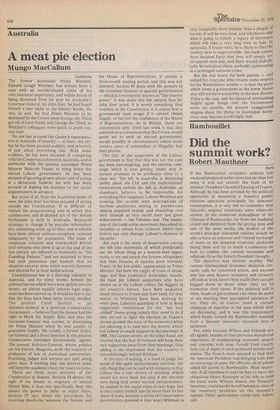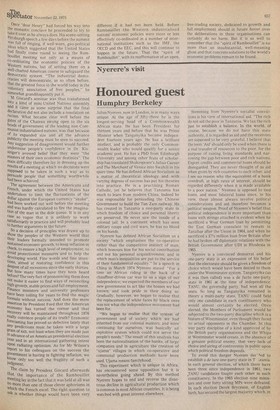Rambouillet
Did the summit work?
Robert Mauthner
Paris If the Ram houillet economic summit last weekend produced rather more hot air than hot news, it was not entirely the fault of its initiator, President Giscard d'Estaing of France. Although he has been accused by his political opponents of mounting a massive public relations operation principally for domestic consumption, it is only fair to remember that Giscard's original intentions were relatively modest. In the cloistered atmosphere of the Chateau of Rambouillet, far from the madding crowd and sheltered from the prying eyes and ears of the news media, the leaders of the world's principal industrial nations would be able to have an informal and relaxed exchange of views on the immense economic problems facing them and try to reach a consensus on how to combat the current recession and inflation. Or so the French President thought.
The objective was entirely worthy. The current international economic situation certainly calls for concerted action, and anyone who has seen finance ministers and treasury pfficials at work knows how easily they can get bogged down in detail when they try to harmonise their views. If the political will is there, heads of government can often do more at one meeting then specialised ministers in ten. They do, of course, need a certain minimum of expertise in the area which they are discussing, and it was this requirement which finally turned the Rambouillet meeting from a discreet monastic occasion into a jamboree.
For, while Giscard, Wilson and Schmidt are all capable, thanks to their previous ministerial experience, of manipulating economic jargon and concepts with ease, Gerald Ford clearlY feels out of depth in such profound intellectual waters. The French were amazed to find that the American President was bringing with him an entourage of some 250 officials, all of whom asked for access to Rambouillet. Most important of all (needless to say) he had to have the ubiquitous Henry Kissinger at his side to hold his hand, while William Simon, the Treasury Secretary, could hardly be left behind in view of the monetary problems on the summit's agenda. Other participants could only follow suit.
Once "dear Henry" had forced his way into the monastic conclave he proceeded to try to take it over as he always does. His scene-setting Pittsburgh speech a few days before the summit was full of ringing, if well-worn, geo-political ideas which suggested that the United States had finally come round to seeing the Rambouillet meeting not only as a means of co-ordinating the economic policies of the Western nations, but of setting them on a well-charted American course to safeguard the democratic system. "The industrial democracies will demonstrate, as so often before, that the greatest force in the world today is the voluntary association of free peoples," he somewhat grandiloquently put it.
M. Giscard's seminar was thus transformed into a kind of mini-United Nations assembly and it came as some surprise that the final declaration did not also include a resolution on racism. What became clear well before the gates of the Chateau swung open to the six heads of government of the leading non-Communist industrialised nations, was that because of its expanded size and all the advance Publicity the meeting must be seen to succeed. Any suggestion of disagreement would further undermine people's confidence in Dr. Kissinger's avowed belief that they were "the masters of their own economic destinies". The main difficulty therefore lay in dressing up the results of a meeting at which no decisions were supposed to be taken in such a way as to persuade people that something worthwhile had been achieved.
The agreement between the Americans and French, under which the United States has undertaken to limit the fluctuations of the dollar against the European currency "snake", had been worked out well before the meeting and was hardly calculated to fire the imagination of th'e man in the dole queue. It is in any case so vague that it is unlikely to work .satisfactorily in practice and will probably lead to further arguments in the future. So a decision of principles was drawn up to Show the peoples of the Western world that their leaders formally intended to promote sustained economic growth, to keep inflation in Check, to ensure a high level of employment, to avoid protectionist measures and to help the developing world. Fine words and fine intent1°r1s, aimed at restoring confidence in this deepest of all recessions since the early thirties. But how many times have they been heard before? The very fact of pronouncing them does not make it easier to find ways of reconciling h?gh growth, stable prices and full employment. Finance ministers and university professors have been toiling for years to find the magic formula without success. And does the mere assertion by President Ford that the American economy has turned the corner and that recovery will be maintained throughout 1976 really convince people of its truth? Economic forecasting has proved so defective lately that . any predictions must be taken with a large grain of salt, not least when they are made just in advance of an American presidential election Year and in an international gathering intent upon radiating optimism. As for Mr Wilson's report to his colleagues on the success the government is having in fighting inflation, we It. bow only too well the fragility of such a judgment.
The claim by President Giscard afterwards that the importance of the Rambouillet meeting lay in the fact that it was held at all was no more than one of those clever aphorisms in Which the French excel. The right question to
i ask s whether things would have been very
different if it had not been held. Before Rambouillet the Western industrialised nations' economic policies were more or less effectively co-ordinated in a number of international institutions such as the IMF, the OECD and the EEC, and this will continue to happen in the future. That the -spirit of Rambouillet", with its reaffirmation of an open,
free-trading society, dedicated to growth and full employment should in future hover over the deliberations in these organisations can certainly do no harm. But it is as well to remember that the "spirit of Rambouillet" is no more than an insubstantial, well-meaning ghost and that concrete solutions to the world's economic problems remain to be found.

































 Previous page
Previous page